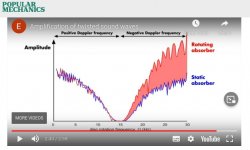The Physics of all this acoustic Spinning Black Hole stuff seems straightforward enough to me...
Black Hole News - How Aliens Could Use Black Holes to Make Energy
Amplification of twisted sound waves - YouTube
We have assembled the usual team to investigate further. Professor Calculus is particularly excited.

Can't wait! 🙂
Black Hole News - How Aliens Could Use Black Holes to Make Energy
Amplification of twisted sound waves - YouTube
We have assembled the usual team to investigate further. Professor Calculus is particularly excited.
Can't wait! 🙂
Attachments
As a former Musical Impresario, I can only tell you what I know. 🙂
Galu's segue into the Hammond Organ and the Don Leslie loudspeaker was deeply interesting: Leslie Rotary Effect for every budget | t.blog
I was trying to think of a good example of this synchronicity. Don't have to look much further than Gregg Rolie on organ with Santana on the "Abraxis" album:
Samba Pa Ti - YouTube
Amazing that the ancients did this with mechanical devices. I am in awe.
Galu's segue into the Hammond Organ and the Don Leslie loudspeaker was deeply interesting: Leslie Rotary Effect for every budget | t.blog
I was trying to think of a good example of this synchronicity. Don't have to look much further than Gregg Rolie on organ with Santana on the "Abraxis" album:
Samba Pa Ti - YouTube
Amazing that the ancients did this with mechanical devices. I am in awe.
That was the second Santana album, a friend had it and the first one way back when, I was like 10 or 12. The Hammond and Leslie go back several more decades before then!
There's lots more details to the Leslie than that article get into - on both fast and slow speeds, the treble rotor turns faster: "On both settings, the treble horn rotates slightly faster than the bass woofer; about 50 revolutions per minute (rpm) for "chorale" and 400 rpm for "tremolo", compared to the woofer's 40 rpm and 340 rpm respectively."
Leslie speaker - Wikipedia
All that and stuff on hot rodding here:
"Unearthing The Mysteries of the Leslie Cabinet"
Amazingly, many pulsars rotate faster, with the equator of some moving at a substantial fraction of the speed of light!
There's lots more details to the Leslie than that article get into - on both fast and slow speeds, the treble rotor turns faster: "On both settings, the treble horn rotates slightly faster than the bass woofer; about 50 revolutions per minute (rpm) for "chorale" and 400 rpm for "tremolo", compared to the woofer's 40 rpm and 340 rpm respectively."
Leslie speaker - Wikipedia
All that and stuff on hot rodding here:
"Unearthing The Mysteries of the Leslie Cabinet"
Amazingly, many pulsars rotate faster, with the equator of some moving at a substantial fraction of the speed of light!
Yes, I've seen one example quoting 24% of the speed of light.Amazingly, many pulsars rotate faster, with the equator of some moving at a substantial fraction of the speed of light!
That's an interesting link on the workings of the Leslie loudspeaker btw.
Just thinking out aloud about getting off fossil fuel gas and going hydrogen.
It takes about 50 kWh to produce 40 kWh (1 kg) of hydrogen from water. You need about 10 liters of water to do that - about 9 kg of that would be turned into oxygen (not good on a massive scale, but hear me out).
If we generate the electricity from renewables, we could completely eliminate fossil fuel gas. Sure, it’s only 80% efficient (best case - probably only 65 or 70 with system efficiencies accounted for). However, no carbon emissions. We could get the electricity from nuclear.
Ultimately, we could use this to not only heat houses but fuel cars as well. Short of running hydrogen qualified pipes everywhere how could it be done? My suggestion is a small hydrogen generator in each home to make the gas.
Churning out huge quantities of oxygen is also not healthy for the environment, but as soon as you burn hydrogen, it recombined with the excess oxygen back to water - so other than the initial emissions (from the power station) to generate the hydrogen, it’s completely emissions neutral.
It takes about 50 kWh to produce 40 kWh (1 kg) of hydrogen from water. You need about 10 liters of water to do that - about 9 kg of that would be turned into oxygen (not good on a massive scale, but hear me out).
If we generate the electricity from renewables, we could completely eliminate fossil fuel gas. Sure, it’s only 80% efficient (best case - probably only 65 or 70 with system efficiencies accounted for). However, no carbon emissions. We could get the electricity from nuclear.
Ultimately, we could use this to not only heat houses but fuel cars as well. Short of running hydrogen qualified pipes everywhere how could it be done? My suggestion is a small hydrogen generator in each home to make the gas.
Churning out huge quantities of oxygen is also not healthy for the environment, but as soon as you burn hydrogen, it recombined with the excess oxygen back to water - so other than the initial emissions (from the power station) to generate the hydrogen, it’s completely emissions neutral.
Bonsai, despite numerous criticisms from my friend M. mcchambin, with his love of Radioactivity, I persist in my view that Windpower is the answer to our problems.
Only tonight I have noticed that half of the UK is sustained by this inexhaustable Energy.
Energy Dashboard - real time and historical UK energy figures, analysis and mapping
Apparently, the UK is planning Quadrupling our Capacity in the next 20 years. Soon we shall be sending it to France. My mind is spinning with windmills.
Only tonight I have noticed that half of the UK is sustained by this inexhaustable Energy.
Energy Dashboard - real time and historical UK energy figures, analysis and mapping
Apparently, the UK is planning Quadrupling our Capacity in the next 20 years. Soon we shall be sending it to France. My mind is spinning with windmills.
Ocean currents are a 24/7 constant process, far more productive than wind or solar. No storage required.
However hydrogen on demand is the the best solution. The problem is no one, even here, is willing to look at it seriously as the link I provided attests.
However hydrogen on demand is the the best solution. The problem is no one, even here, is willing to look at it seriously as the link I provided attests.
Agree wind has turned out to be seriously good for the UK. Interestingly, Kenya (although total demand is of course much much lower) gets most of its electricity from wind ie >>50%.
I should have been clearer in my earlier post - it more about using the existing gas infrastructure to deliver hydrogen, hydrogen capable requirements notwithstanding.
The estimated costs of taking the global economy from oil to hydrogen were (IIRC) $100 trillion.
Disco-Pete, going hydrogen is a good thing, but you can’t make a perpetual machine - no system is 100% efficient. I think the criticisms leveled at your earlier post were to do with that aspect. I can see a car that uses hydrogen and also creates it, but it will need a ‘top-up’ energy source like a battery.
Some will argue in all this though why not just go 100% electric? For cars, the minerals required for batteries, like oil and coal, won’t go in for ever. At some point we will have to think about going hydrogen.
Here’s the latest UK energy dashboard. Thank goodness it’s blowing a gate out in the North Sea! (Seems nuclear is under ‘low carbon’ which I don’t quite understand).
I should have been clearer in my earlier post - it more about using the existing gas infrastructure to deliver hydrogen, hydrogen capable requirements notwithstanding.
The estimated costs of taking the global economy from oil to hydrogen were (IIRC) $100 trillion.
Disco-Pete, going hydrogen is a good thing, but you can’t make a perpetual machine - no system is 100% efficient. I think the criticisms leveled at your earlier post were to do with that aspect. I can see a car that uses hydrogen and also creates it, but it will need a ‘top-up’ energy source like a battery.
Some will argue in all this though why not just go 100% electric? For cars, the minerals required for batteries, like oil and coal, won’t go in for ever. At some point we will have to think about going hydrogen.
Here’s the latest UK energy dashboard. Thank goodness it’s blowing a gate out in the North Sea! (Seems nuclear is under ‘low carbon’ which I don’t quite understand).
Attachments
Last edited:
Here in NZ the gas distribution operator is starting trials with natural gas / hydrogen blends. Apparently can be up to 30% hydrogen without requiring appliance modifications. Some particular steels used in piping can be susceptible to hydrogen embrittlement so that needs to be taken into account. Obviously if the green electricity can be used directly then that is better than using it to make hydrogen, but hydrogen is useful in particular circumstances (e.g. high temperature heating, as an energy storage medium, heavy transport etc.).
Despite my mockery of the planned Fusion reactor as a white elephant designed to generate money for engineering consultants it might work apparently. But is 20 years down the line. 🙂

The Engineers feel that current processes when ramped up will yield a net gain of energy. Presumably, Deuterium (heavy water and all that) will become a popular resource.
I also find that people are also exploring for Lithium to make more car batteries. Cornwall is loaded with the stuff apparently. Will become some huge mine. 😱
Transport is only 16% of energy production I believe. I can't see much wrong with running cars on more friendly fuels rather than electric. Methanol? I don't know.
The real answer is a raft of small measures IMO. Lots of little things. But people are really thinking the bottom line will be to stop burning coal and oil. And we could really end our love affair with throwaway plastic. It's ludicrous the garbage you get with a cup of coffee and a burger. It's gotta go somewhere.
The Engineers feel that current processes when ramped up will yield a net gain of energy. Presumably, Deuterium (heavy water and all that) will become a popular resource.
I also find that people are also exploring for Lithium to make more car batteries. Cornwall is loaded with the stuff apparently. Will become some huge mine. 😱
Transport is only 16% of energy production I believe. I can't see much wrong with running cars on more friendly fuels rather than electric. Methanol? I don't know.
The real answer is a raft of small measures IMO. Lots of little things. But people are really thinking the bottom line will be to stop burning coal and oil. And we could really end our love affair with throwaway plastic. It's ludicrous the garbage you get with a cup of coffee and a burger. It's gotta go somewhere.
Wind yearly average power is 25% of the installed power.
When there is lack of wind, it is supplemented by gaz mostly supplied in Europe, from Russia.
Concerning global warming, presently, gaz is worse than coal because of methane leaks in production and distribution and methane leaks are unavoidable in the hydraulic fracturing. Methane is way more noxious than CO2.
Energy issues are not fairly discussed, all is drawn in lobbying, politics and bad faith.
The time is coming to face realities.
When there is lack of wind, it is supplemented by gaz mostly supplied in Europe, from Russia.
Concerning global warming, presently, gaz is worse than coal because of methane leaks in production and distribution and methane leaks are unavoidable in the hydraulic fracturing. Methane is way more noxious than CO2.
Energy issues are not fairly discussed, all is drawn in lobbying, politics and bad faith.
The time is coming to face realities.
With current technology, the engine turns the alternator which powers the battery. That does not change. The only difference is the addition of the circuit for electrolysis of the water which is hooked up to the battery as any other accessory. Flip the switch, the process begins feeding the engine, turn the ignition key, the engine starts, depress the accelerator, the car moves. As before, the alternator is still charging the battery which is now responsible for providing the current necessary for hydrogen production. The trick here is that it is produced on demand as the accelerator pedal connected to an attenuator regulates it. So there is no storage and hence extremely safe. This system has already been invented and being used.‘top-up’ energy source like a battery.
It can be translated to any use. The only residue is pure distilled water. A perfect cycle.
Yes
Okay at this point I have to ask, and I mean no disrespect, but there seems to be a mental block enmasse taking place here. Why can't you guys get your heads around this concept? Is it because it's just too good to be true?
Okay at this point I have to ask, and I mean no disrespect, but there seems to be a mental block enmasse taking place here. Why can't you guys get your heads around this concept? Is it because it's just too good to be true?
Last edited:
You can produce hydrogen with your car, using the alternator to produce electricity, then use it to produce hydrogen.
Here some energy from the burnt gasoline is converted into energy in the hydrogen.
So far so good.
Now you want to use the energy in this hydrogen to run or help running the engine.
Here is the trouble:
That energy is less than the energy we started with, from the burnt gasoline.
There is no free lunch, in every energy conversion, there is some loss.
Such a recycling cannot produce a net gain, it is just the opposite, finally it does a waste of gasoline.
Here some energy from the burnt gasoline is converted into energy in the hydrogen.
So far so good.
Now you want to use the energy in this hydrogen to run or help running the engine.
Here is the trouble:
That energy is less than the energy we started with, from the burnt gasoline.
There is no free lunch, in every energy conversion, there is some loss.
Such a recycling cannot produce a net gain, it is just the opposite, finally it does a waste of gasoline.
Wow, I'm amazed to say the least!then use it to produce hydrogen.
NO. You now have a water tank instead of a gas tank... car sitting in the driveway, battery is fully charged, you with me?
Okay, flip a switch powering on the electrolysis circuit, hydrogen is now immediately being produced at the air intake of the engine. Still with me?
Okay, turn ignition key to start position and VOILA, the engine is now running from the hydrogen being produced in real time.
The trick as I already mentioned, is that hydrogen is being produced in the volume required by the engine at any given moment commensurate to demand dictated by your foot via the pedal which is connected to the attenuator that regulates production via the electrolysis circuit. Hence the "hydrogen on demand" phrase.
The engine still operates as before by internal combustion, therefore turning the alternator which in turn charges the battery which provides the current required for electrolysis. In fact, very little modification is required to the engine. You basically now fill your tank with water instead of gas. Get it? 😉
Last edited:
Let's assume the engine runs from hydrogen.
No gasoline, but what I said earlier does apply.
You fuel your engine with hydrogen.
Your engine makes hydrogen. So far, so good.
The trouble is: The produced hydrogen is less than the hydrogen you started with.
There is no energy coming from the water.
It takes some energy to turn some water into hydrogen, at best, using this hydrogen will give you back that same energy.
Edit: The efficiency of the alternator is good, the efficiency of the electrolysis is good, the efficiency of the engine is very bad.
Very bad because there is conversion from thermal energy to mechanical energy.
No gasoline, but what I said earlier does apply.
You fuel your engine with hydrogen.
Your engine makes hydrogen. So far, so good.
The trouble is: The produced hydrogen is less than the hydrogen you started with.
There is no energy coming from the water.
It takes some energy to turn some water into hydrogen, at best, using this hydrogen will give you back that same energy.
Edit: The efficiency of the alternator is good, the efficiency of the electrolysis is good, the efficiency of the engine is very bad.
Very bad because there is conversion from thermal energy to mechanical energy.
Last edited:
You start with ZERO hydrogen!!!!!!!The trouble is: The produced hydrogen is less than the hydrogen you started with.
It is produced in real time by ELECTROLYSIS.
Production begins on power up of the "electronic electrolysis circuit/module" at which moment start up of the engine is possible to take place. Electrolysis has not stopped but continues thereby continuing to power the engine.
I can't believe you're not able to grasp this. You're kidding, right? 🙂
Last edited:
- Status
- Not open for further replies.
- Home
- Member Areas
- The Lounge
- What is the Universe expanding into..



